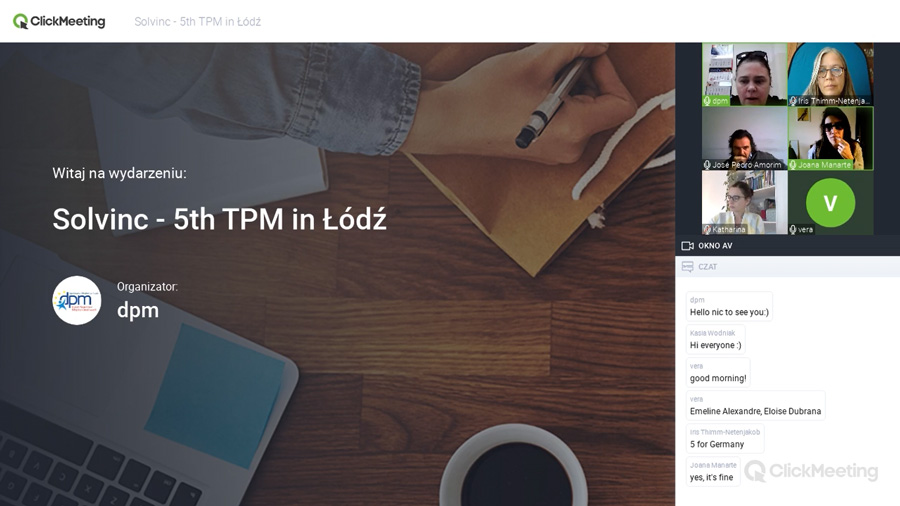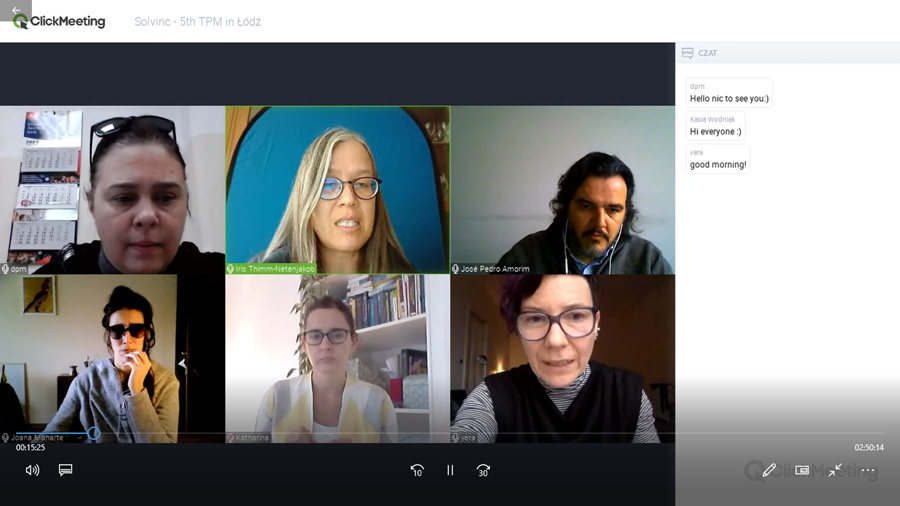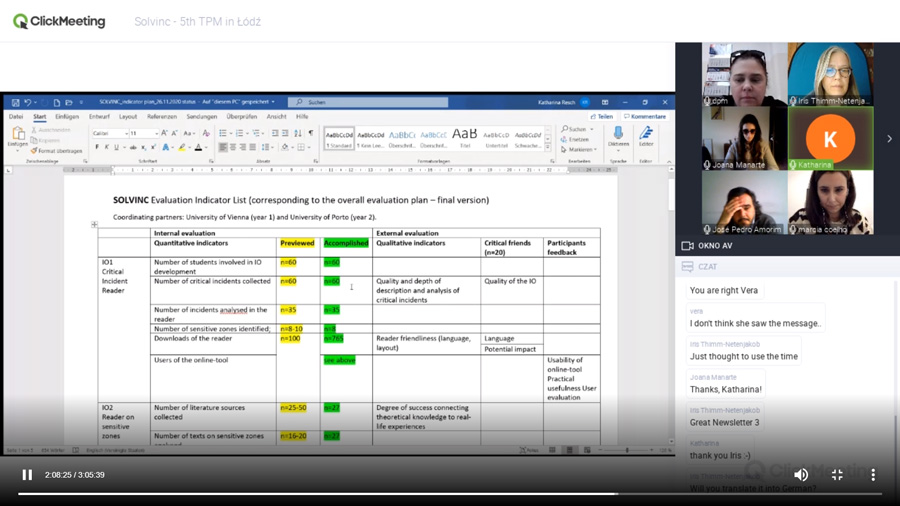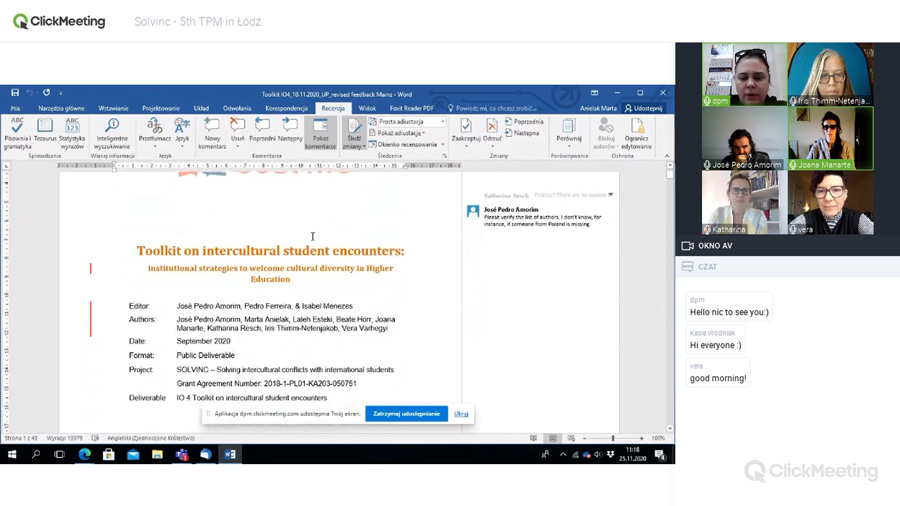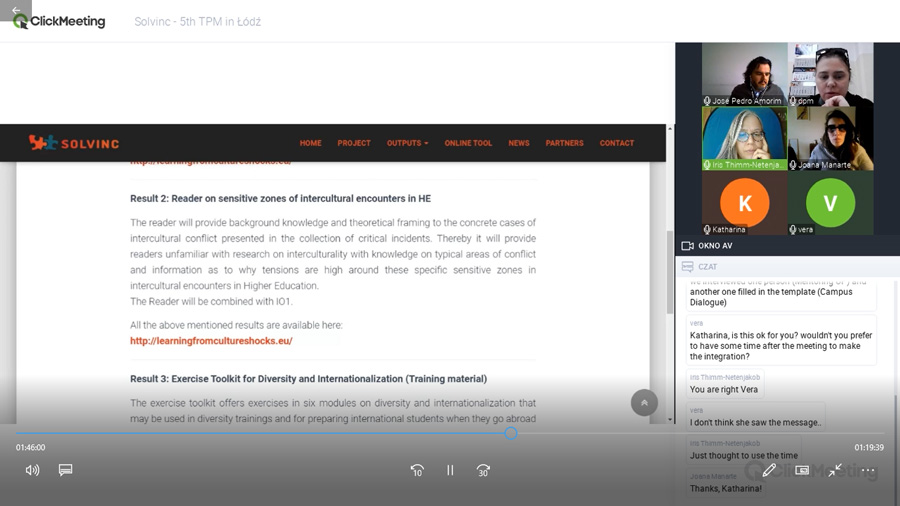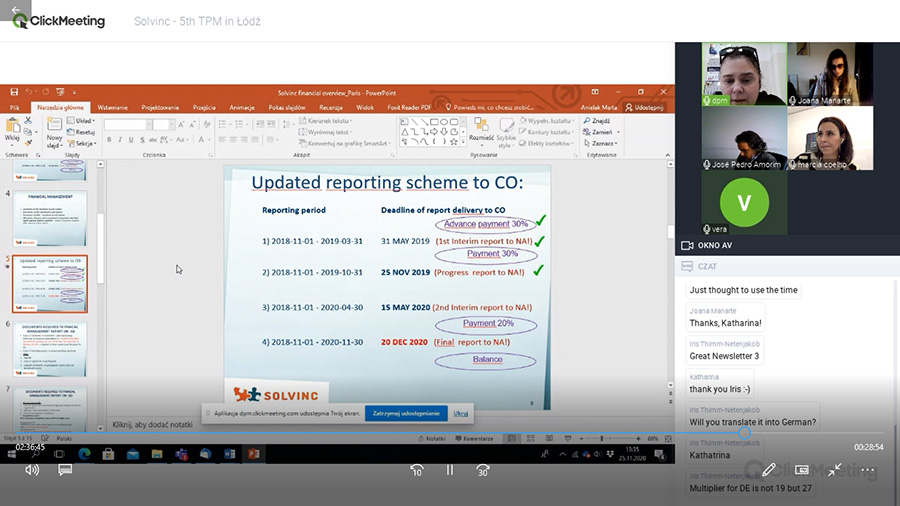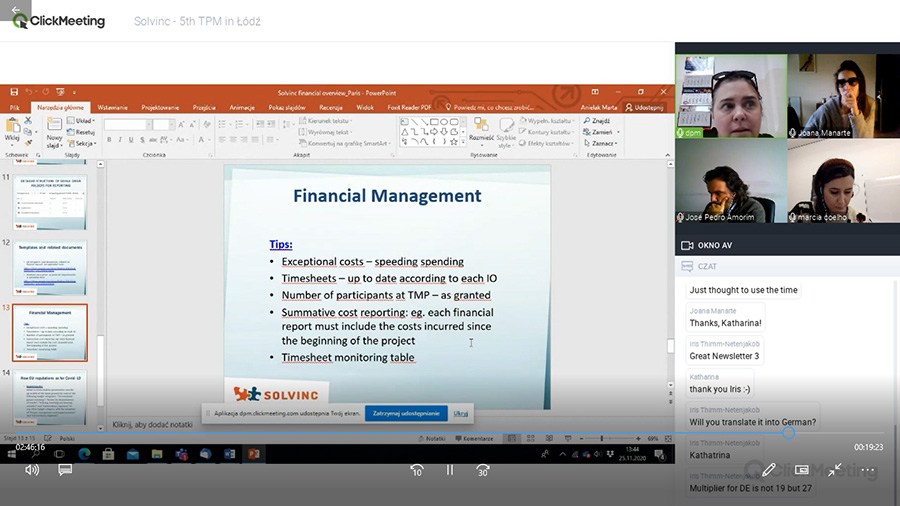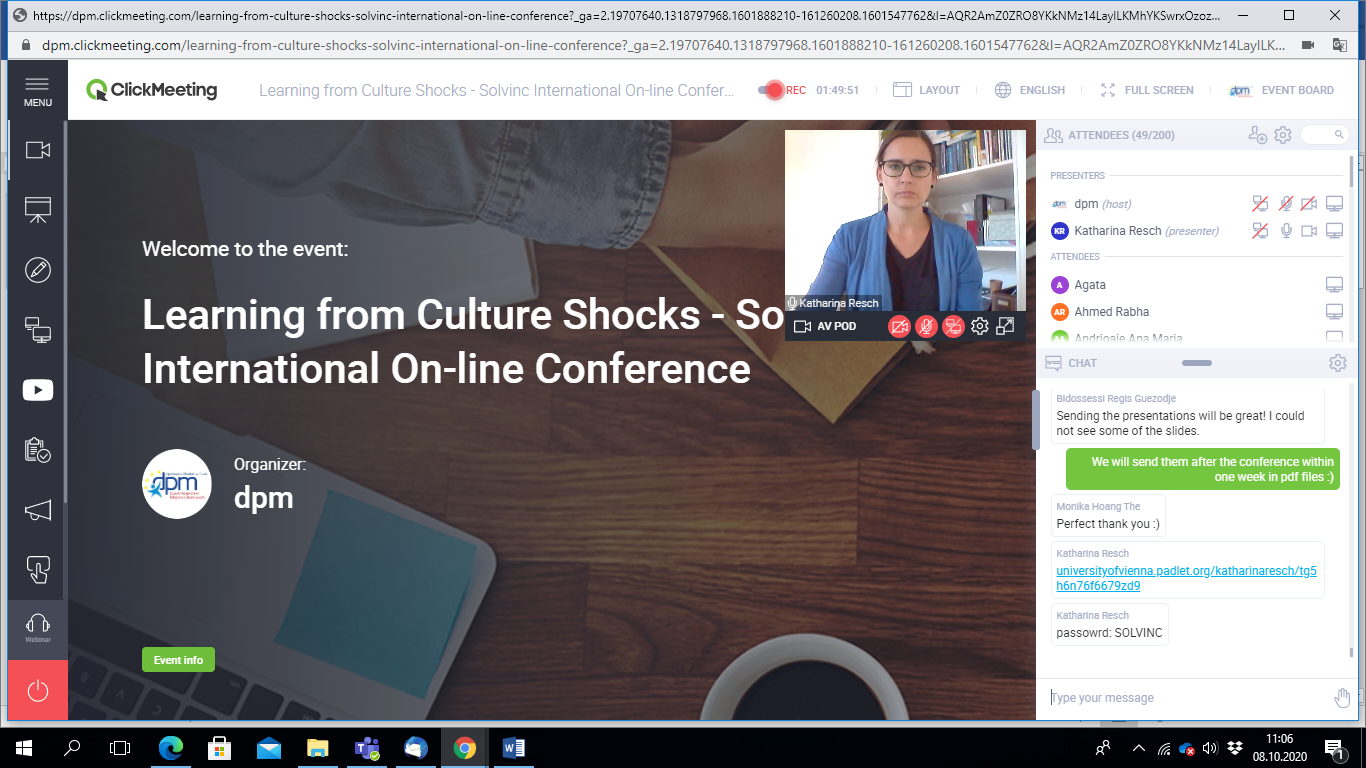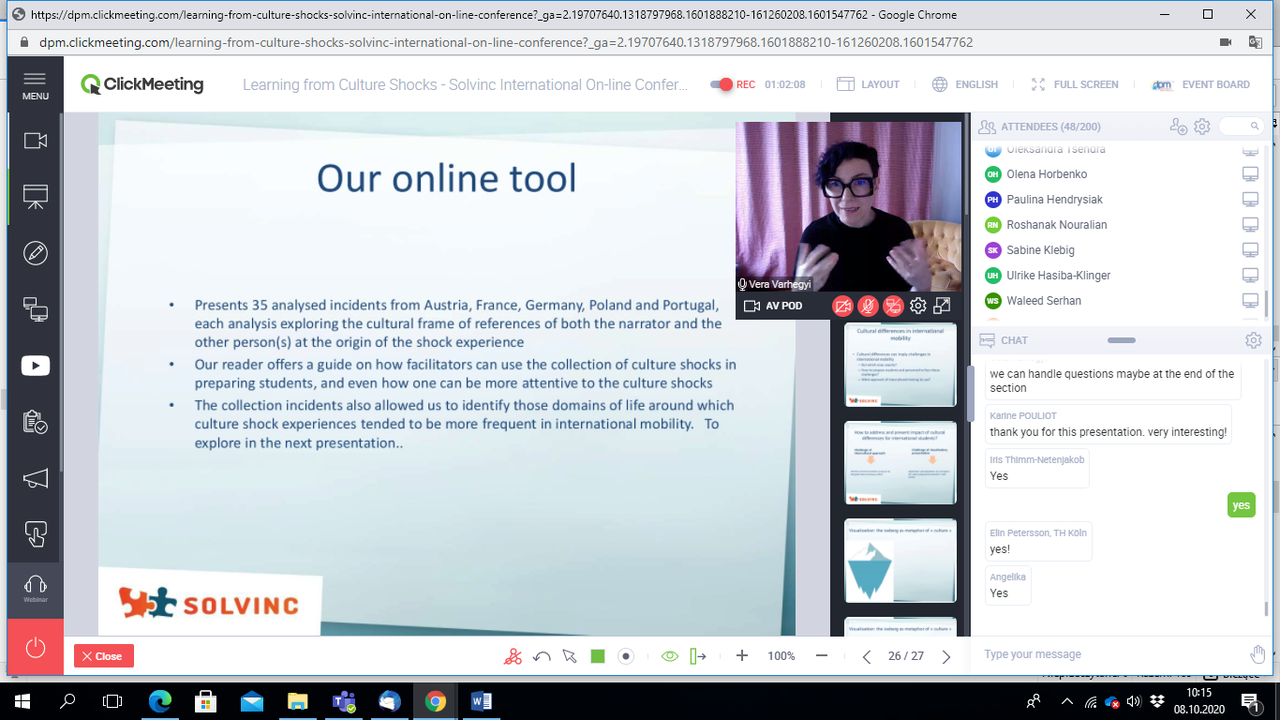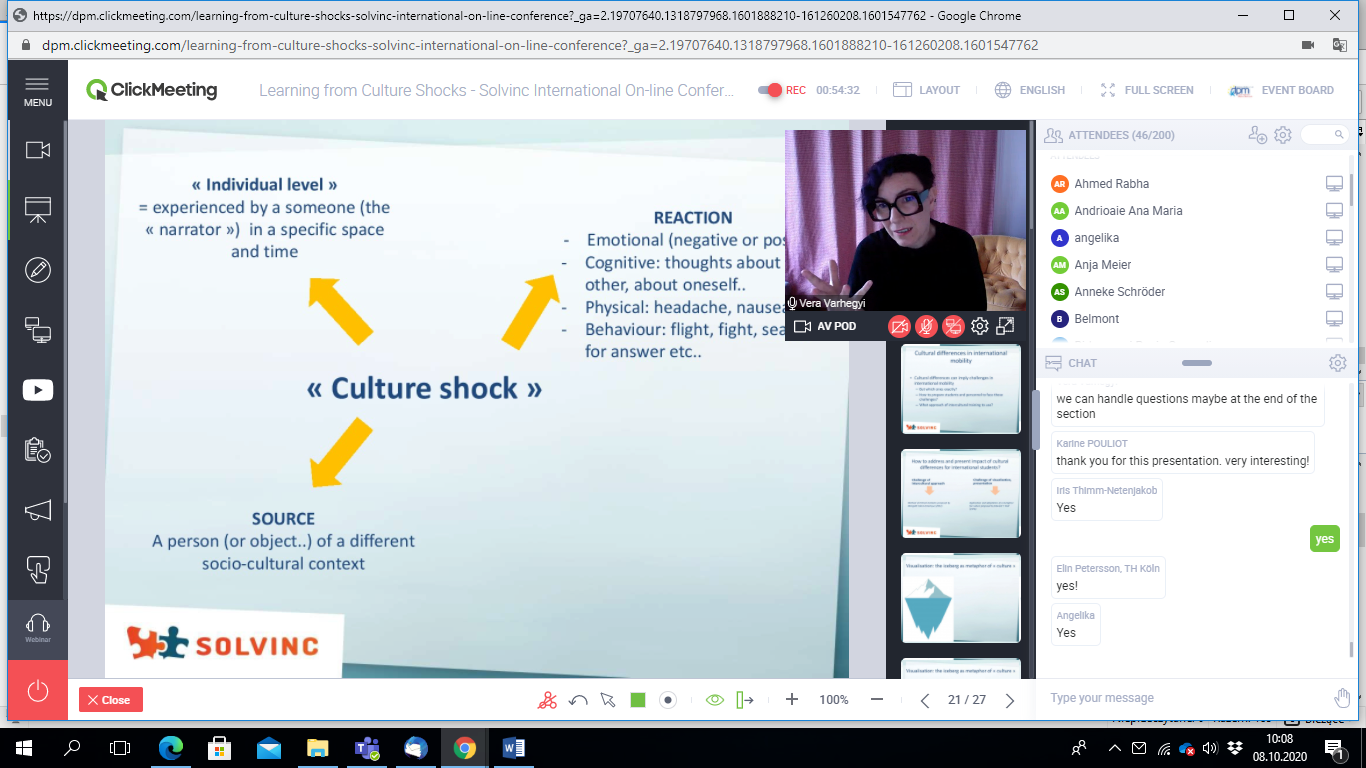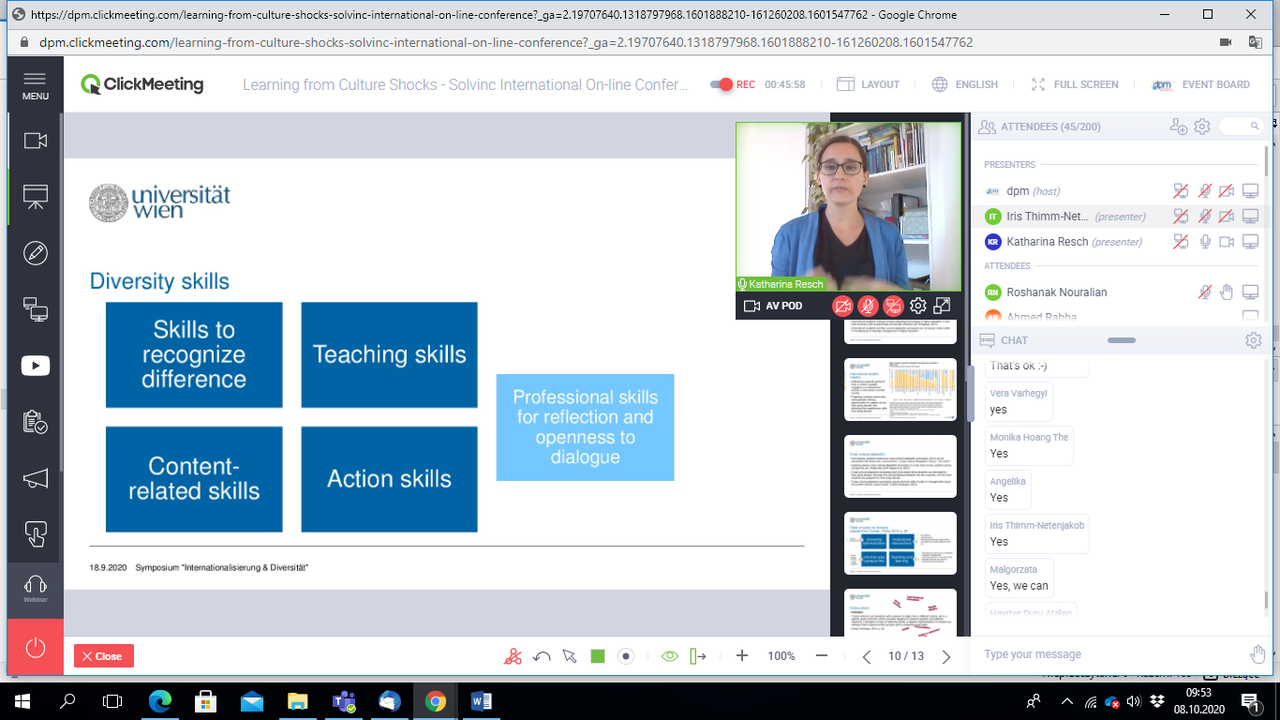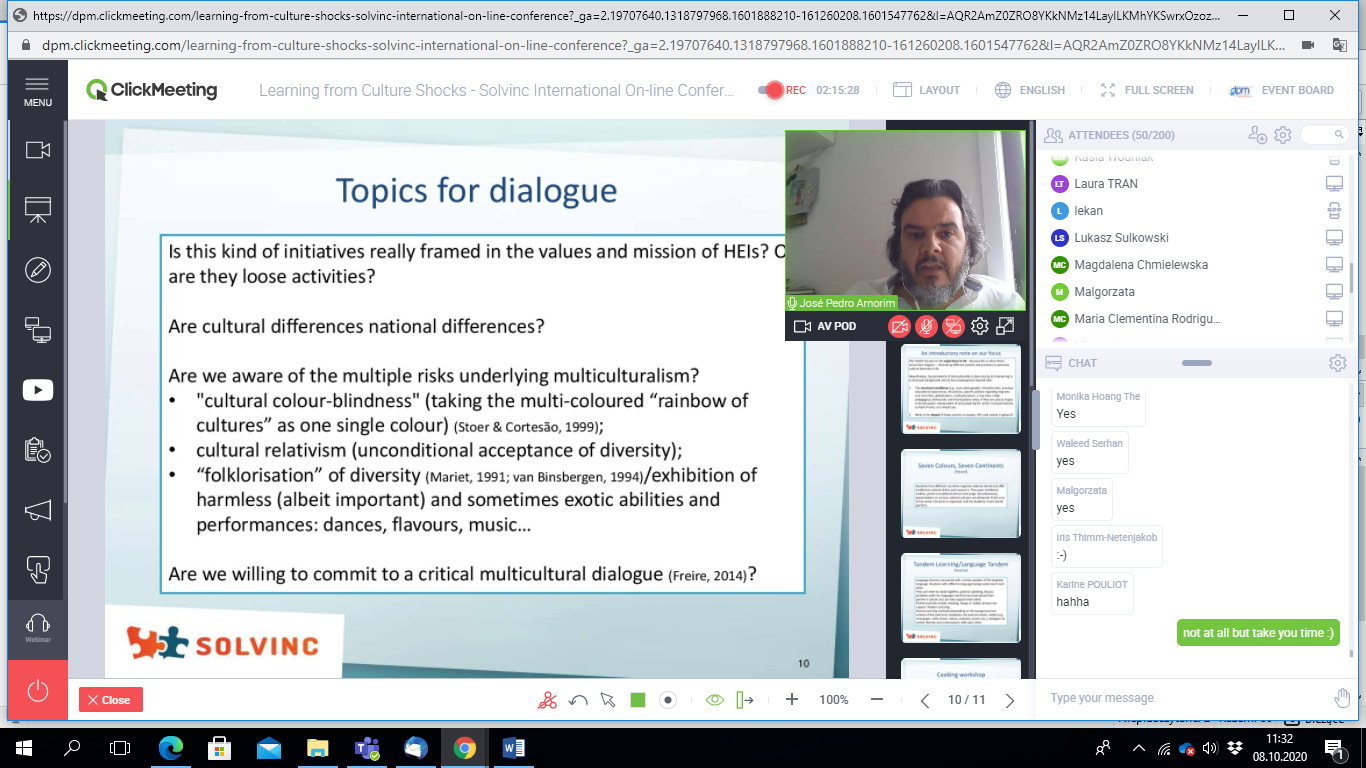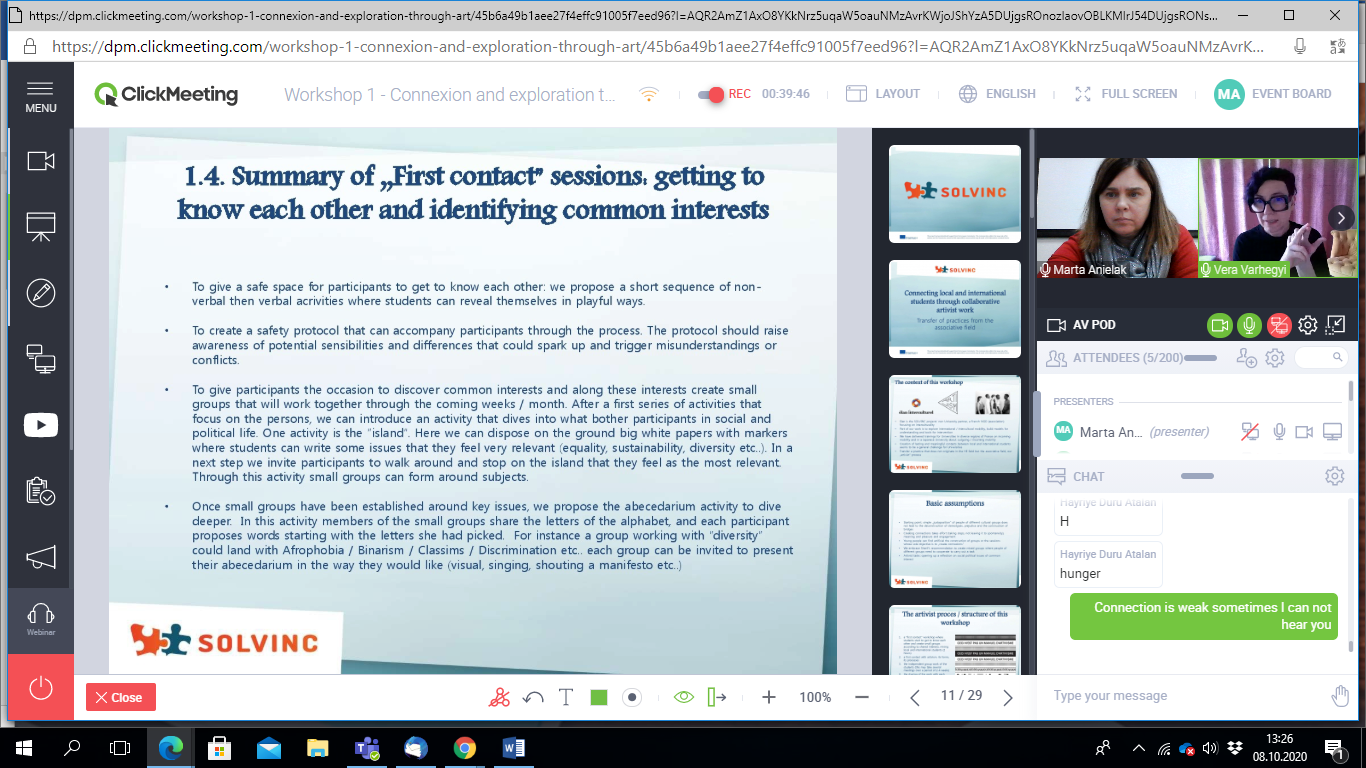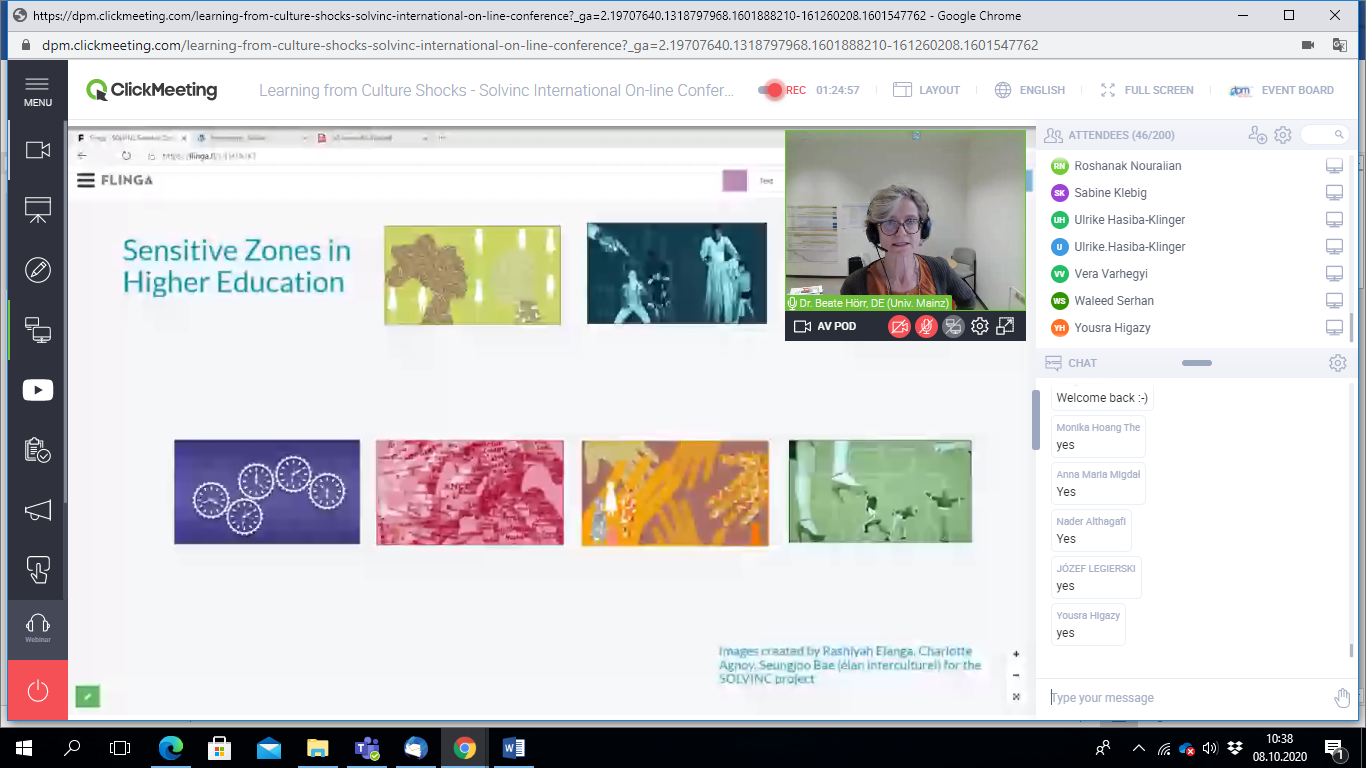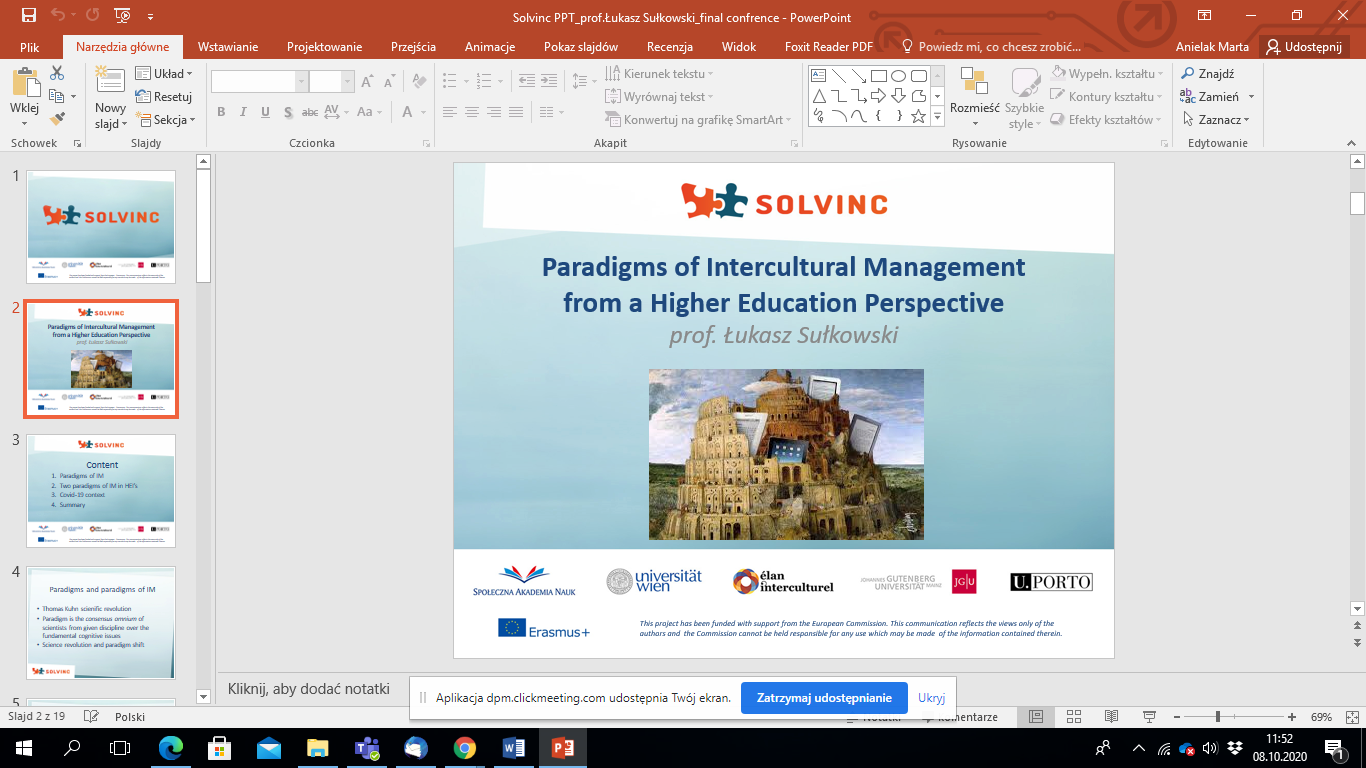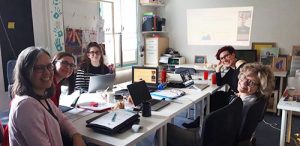Let’s be in touch!
The SOLVINC project officially ended on the 30th November 2020. However, our commitment to international mobility did not. The partners of the project would be happy to share with you the tools and training materials developed during the project, to explore how they could be adapted in your context. If you want to explore the possibilities of collaboration please contact the lead applicant: www.solvinc.eu/contact
We hope that 2021 will be a better year for international mobility, and we’d be happy to contribute making mobility a real source of learning.
The 5th and last international on line meeting
On November 25, 2020, by the use of Click meeting platform, the 5th and last international on line meeting of the Erasmus + Solvinc project took place. Partners from France, Poland, Portugal, Austria and Germany summarized the results of activities developed as part of two-year cooperation, discussed all disseminated events promoting the project, and planned preparations for the final report. In the period from 1/11/2018 to 30/11/2020 the following aims were realized by the whole partnership:
- Collecting and analyzing instances of intercultural conflict experienced by international students and making it available in an interactive online version (narrative)
- Developing a reader on main areas of conflict / sensitive zones
- Developing training material for Higher Education staff supporting professional development (educator’s training)
- Developing a toolkit on intercultural student encounters and implement different formats at the partner institutions
As a result of the above 4 intellectual outputs were produced:
O 1: Critical Incident Reader and Online-Tool: Solvinc (learningfromcultureshocks.eu)
IO 2: Reader on sensitive zones of intercultural encounters in Higher Education
IO 3: Training material for Higher Education staff
IO 4: Toolkit on intercultural student encounters
Solvinc project contributed to reaching higher societal goals, as: - Promote social inclusion of international students and combat discrimination
- Further intercultural learning and understanding
- Promote a diversity-oriented culture in institutions of Higher Education (active Diversity Management)
- Facilitate staff development and training of intercultural skills
- Enhance the social responsibility of Higher Education institutions
- Support internationalisation of Higher Education institutions
More info about all project’s products you can find here: www.solvinc.eu
Newsletter 4
International on-line conference and workshops
„LEARNING FROM CULTURE SHOCKS”
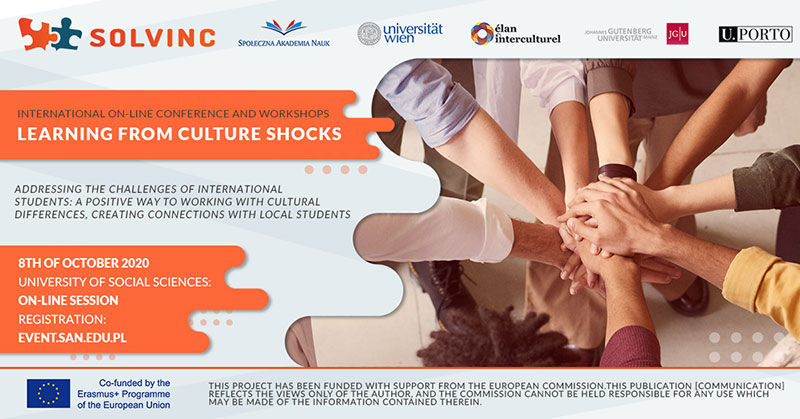
We are pleased to announce that on October 8, 2020, an international online conference was held under the title: „Learning from Culture Shocks – Addressing the challenges of international students: a positive way to working with cultural differences, creating connections with local students” devoted to modern tools and technologies supporting dealing with intercultural conflicts in the academic environment.
This event was the highlight of 2 years of cooperation within the project: Erasmus + Solvinc – Solving intercultural conflicts with international students, implemented between partners from Poland, Austria, Germany, Portugal and France. During the conference, the partnership presented all the intellectual results generated by the project, as well as workshops on various international academic events and a panel discussion on culture shock and its multi-layered implications. Our special guest: Prof. Łukasz Sułkowski from the University of Social Sciences presented an interesting lecture on the paradigms of intercultural management from the perspective of higher education.
The conference was conducted in English, which allowed the participation of many international guests. On behalf of the Social Academy of Sciences – the project coordinator, we would like to thank everyone for participating in the conference, and in particular the entire consortium for fruitful cooperation.
Newsletter 3
Newsletter 2
On March 5-6, 2020, 4th partnership meetings were held in Paris under the Solvinc project.
Due to the epidemiological situation in the world related to the COVID-19 coronavirus pandemic, the meeting was partly on-line.
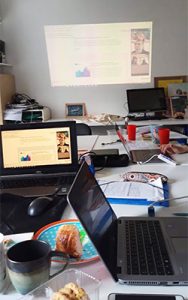
During the meeting, partners from Poland, France, Portugal, Austria and Germany discussed the final version of the so-called sensitive zones that may be encountered by students and lecturers in an intercultural environment, as well as the final appearance of the on-line tool in which the above-mentioned zones, as well as other information on the results developed under the project will be presented in a friendly and intuitive way.
An additional point of discussion during the 2-day meeting was the discussion of training modules that will be developed to help the academic community understand intercultural differences as well as to plan further activities under the project. For more information, please visit: www.solvinc.eu and the educational platform: www.learningfromcultureshocks.eu
Meeting in Vienna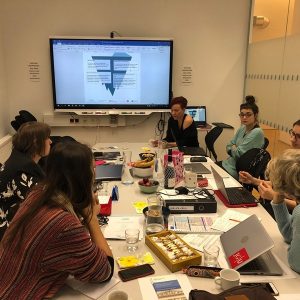
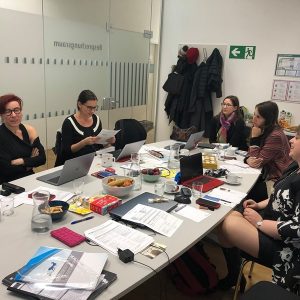
On 12-13.11.2019 in the charming city of Vienna, 3 partner meetings took place as part of the Erasmus + Solvinc project. Partners from France, Portugal, Germany, Austria and Poland summarized case studies on intercultural conflicts at universities, as well as planned further activities related to conducting training for academic staff on coping with difficult situations and identifying sensitive zones against the background of differences in different countries’ origin within an international student environment.
Soon all analyzed critical incidents as well as Reader on sensitive zones of intercultural encounters in HE will be presented as an on-line tool kit.
Meeting in Mainz
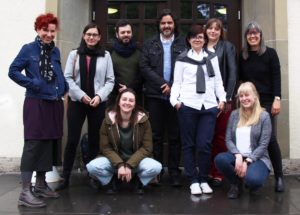
The second Partner Meeting of the SOLVINC project took place on 8-9 May in Mainz. First results of the analysis of multiple critical incidents were discussed and the second phase of the project, the definition of sensitive zones using relevant literature was initiated. The outcome of this step will be a reader on sensitive zones of intercultural encounters in Higher Education.
Newsletter 1
Joint Staff Training Activity in Paris


On 21 – 23 January, 2019 representatives of partners countries met in Paris to participate in the Joint Staff Training Activity organized in the framework of Solvinc project.
The main aim of the meeting was to learn the Cohen-Emerique’s critical incident methodology. Based on the article „Le choc culturel, methode de formation et outil de recherche” by Margalit Cohen-Emerique. In: Demorgon,J., Lipiansky,E.,M. (eds) Guide de l’interculturel en formation. Paris, Retz. pp 301-315, 1999, the definition of culture shock was created. It was defined as an interaction with a person or object from a different culture, set in a specific space and time, which provokes negative or positive cognitive and affective reactions, a negative representation of oneself and a feeling of loss of reference points and a lack of approval that can give rise to uneasiness and anger.
The intercultural approach is an innovative and practical strategy for dealing with culture shock based on three steps, each involving different training methods and tools and requiring the development of different competences.
Participants learnt about the basics of the methodology and how to conducts the workshops on this with students. Partners will use the abovementioned method to collect Critical Incidents from international and national students as well as academic and administrative staff.
What are Critical Incidents in the Solvinc project?
It is the situation when participants experience the misunderstanding, shock, conflict or problems due to the cultural differences between them.
Kick-off meeting in Porto

On 17-18 December 2018 Partners from Portugal, France, Austria, Germany and Poland met in Porto, Portugal for Kick-off meeting of Solvinc project!
Project Solvinc aims to facilitate the development of intercultural and conflict management skills among international and local students as well as HE staff and further the implementation of intercultural student encounters in HEIs, thereby contributing to the promotion of inclusion in practice.
During the meeting, Partners discussed the distribution of tasks and decided on the next steps. Among the tasks is the collection of Critical Incidents, which are defined as the cultural shock experience of international students, was considered the most important task for now. The Incidents, after collection and careful selection, will be analysed by the use of Cohen-Emerique methodology.
